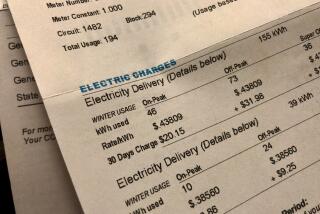Sound of Silence Versus Phone Charge
- Share via
Question: About eight years ago I became totally deaf from a high fever. Because I am not acquainted with the people of the deaf community, I rely constantly on the world of sound although I am, literally, not in that world any longer.
My problem is this: I have for the past seven years rented a machine call the Telautograph, which needs to be used in conjunction with an answering service. Last year, because of the horrendous monthly charge of two machines, we bought the one we had rented. We must have an answering service because it picks up the signal of a caller. I am then notified by the lights in my home that someone is on the line. Now, it is the job of the service to write that message. The caller hears my voice, but I read what the caller is saying--so far, so good. Besides being terribly costly for me to have this luxurious habit of wishing to communicate, our new telephone bill has escalated. We must pay for the line that the telephone company installed--in my case that was close to five years ago--from our apartment to the office of the answering service about six long blocks away.
The telephone company charges us for mileage, which in my estimation is totally unfair. Why should a monthly charge penalize us when the line should have been a one-time charge? Must I pay this charge forever, as I expect to be totally deaf forever?
Most deaf people have a machine called the TDD, and I am very familiar with its operation. For someone who has been deaf for years and who has surrounded himself with friends similarly afflicted, it is perfectly understandable. For someone like me, however, it is useless. I know no other deaf people, as this unfortunate handicap is too new to me. My contact with the outside world would collapse if I didn’t have the type of equipment that we have. I sincerely hope that some research on your part can help me out. The price that we are charged for the service is $45.99 a month.
--J.B. Answer: Unless--through some health fluke--an individual with otherwise normal hearing loses it temporarily, there is no way in the world to appreciate the loneliness of the deaf.
Recent, ongoing strides in the efficacy of hearing aids are generally encouraging, and while some of these dramatic gains have indeed taken place in telecommunications--and in the mandated availability of them for the deaf--no improvements can ever be rated much higher than “better than nothing” for anyone like you who had long experienced normal hearing.
One big stride, of course, was Senate Bill 597, which became law in 1979; it ordered the state’s 23 telephone companies to levy a 3-cents-a-month surcharge on everyone’s phone bill in order to provide the deaf with TDDs--Telecommunication Devices for the Deaf. According to Lissa Zanville, a PacTel spokesperson, this is an attachment that translates the message to visible characters in the deaf person’s home--either scrolling it across a screen or, via a portable printer, on paper. As invaluable as it is as a communications device, however, its principal limitation is pretty obvious--the person with whom you are corresponding must also have a TDD (which, happily, many fire and police departments and paramedics do have).
But, as you point out, it’s of limited use to you (although, Zanville assures me, you do indeed have one) because you don’t have a circle of friends with comparable equipment.
The Telautograph that you have is certainly better suited to your needs, although it’s more expensive than a TDD, which is free to you. They cost, according to your husband, roughly $2,000 to $3,000 apiece. Now, double that expenditure, since this arrangement of yours requires not one machine but two--the one in your home and the one you had to buy for your answering service, A-Super Answering Service in Beverly Hills. The service acts as middleman in transmitting the caller’s end of the conversation to your home, supervisor Joyce Bell says.
At this point, unfortunately, our research into why you are being billed $45.99 a month, by someone, bogged down in a big way, thanks in large measure to the government’s breakup of American Telephone and Telegraph. The breakup has left the various fragmented parts of poor old Ma Bell largely ignorant of what the other, spun-off companies are doing. PacTel’s examination of your telephone bills over the past several months, for instance, shows no such charge, and “as a matter of fact her bills are relatively low because of the discounted rates that all deaf people receive,” Zanville adds. “That’s 30% off all daytime calls, 60% off all evening calls and 75% off nighttime calls.”
Your answering service tells me that you aren’t being billed by them either, except for the normal monthly answering charge.
So who is billing you this $45.99?
Further probing reveals that the bills are coming--apparently not from PacTel nor from your answering service, but from AT&T;!
AT&T;, under the court-ordered divestiture, is now left almost entirely with the long-distance and product-end of what used to be the world’s biggest monopoly. What does this have to do, under the new corporate setup, with a $45.99-a-month charge for a supposedly private line connecting your home to your answering service?
“It can’t be us billing them,” a baffled AT&T; spokesman, Mike Pollock, protests. “It has to be coming from PacTel.”
But, obviously, it isn’t.
And there, curiously, the mystery rests. Someone is billing you, and someone is cashing your monthly checks, but who?
Keep tuned. I’ve given Pollock’s private telephone number to your husband so that between the two of them there should be some way to solve this puzzle of the phantom telephone bill. And please keep in touch--we can’t leave this just hanging where it is now.


